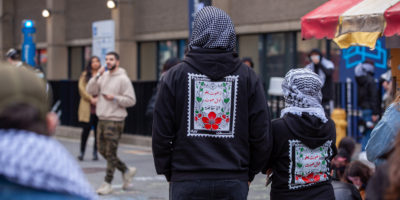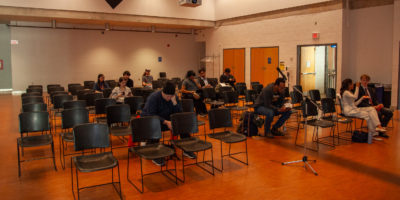By Laura Blenkinsop
The singers’ voices ring out over the congregation of swaying students. Their arms raised in the air and their eyes closed, the worshippers don’t need to read the lyrics projected on the screen.
“God almighty, Lord of glory, you have called me friend!” Belting the lyrics, one follower puts her hands on her heart.
Just over 20 people from the Winners Christian Fellowship are gathered on a Monday night in the multi-purpose room in the Student Campus Centre.
In the same room three days earlier, Muslim students stood shoulder to shoulder performing Jumu’ah prayer, their backpacks piled beside the door.
Despite criticisms that faith groups area exclusionary, religion has a home at Ryerson. Muslims break fast together at Devo, Hillel members pitch a tent outside the SCC for discussions, Christian groups post glossy ads around campus to bring in new members, and Hindus celebrate Holi Lunch in the Hub.
The last two years have seen struggles between groups vying for space to pray. Last week, the Senate approved a plan to review its religious policies — a review prompted by a demand from Muslim students for a class-free block of time set aside on Fridays for Jumu’ah.
Religion invites questions about the value of mixing faith and education.
For Clare O’Handley, religion is too much a part of her to leave at home.
“After I moved out of my family I just realized that it was a big part of my identity that was important to me, that I should foster,” she says.
The second-year social work student serves as an executive on the Catholic Students’ Association.
“For me it provides a support network with the other students who come and it provides a place where I can practice my faith. It’s a little subcommunity within the Ryerson community,” she says.
O’Handley even brings her schoolwork to the centre and discusses it with the chaplains when she needs to understand the material within the context of her faith.
“The perspective that Ryerson takes, which is called the anti-oppressive theory, doesn’t recognize religion at all. It’s very structural,” she says.
The Catholic Students’ Association is one of 14 religious groups at Ryerson. There are three Islamic student groups, and at least five Christian groups. There are groups for Hindu, Jewish and Buddhist students as well.
On Friday afternoon, two third-year early childhood education students are in the SCC washroom getting ready for Jumu’ah. Twins Asma and Lubna Khan are fixing the coloured pins that stop their hijabs from slipping during prayer.
Walking past the main entrance to the multi-purpose room, they wind their way through a concrete janitor’s hallway.
They take off their shoes at the sisters’ entrance and join friends on the fabric panels lining the floor.
Lubna explains why having Jumu’ah at Ryerson is important.
“Being a Muslim, having these activities like prayer — they uplift me that I’m actually worshipping my God and I’m studying together so it makes me feel that I can do both things together because actually I would prefer worship more than my classes.”
She says Islam is a way of life and the Muslim Students’ Association and the events they organize help practising Muslims feel engaged in the university.
Isaac Elfaks joined Jewish group Hillel to help him adjust to life at Ryerson.
“As the Jew coming out of private school, I felt like a fish out of water. By having Hillel on campus, it kind of eased me in,” he says.
In his third year in information technology management, Elfaks says that “just studying sucks.” For him religion has a place at university.
“Religion is heavily related to your ethics and your ethics are related to school,” he says. “Ethics are entwined with how you run your life and what you do. So they go hand in hand.”
Ryerson’s Hillel is a local chapter of a bigger organization, which helps its members organize events and maintains a building at the University of Toronto. The Muslim Students’ Association, for instance, boasts scores of chapters across North America.
Terence Wright, a member of Ryerson’s Atheist Alliance, says that religion has every right to be on campus, but sees faith groups as being exclusionary.
“By not having a religion, we don’t get to participate the way they do,” he says. He’s not happy that there are numerous groups representing the same religions.
“We feel outnumbered. We’re not the majority by a longshot,” he says.
Moses Akingbade, who founded Winners Christian Fellowship in 1998, says his group encourages everyone, Christian or not, to come. He says the ones that do often convert.
“We believe that Jesus Christ is not for Christians only, he’s for atheists, he’s for Buddhists, he’s for everybody,” says Akingbade.
For the believers, the battle is not over how much religion to have on campus, but how to keep it up.
During mass at the Catholic Chaplaincy Centre, O’Handley stands at a podium at the front of the chapel reading a passage from the Bible. Only four other Catholics are in the room — two Ryerson staff and the chaplains who run the place.
Religion doesn’t run counter to school, she says. Her faith even motivated her to choose her program.
“I think that there’s a lot of common ground between the values of social work and the values of my faith,” she says. “Like social justice, respect for others and the worth of a person.”









Leave a Reply